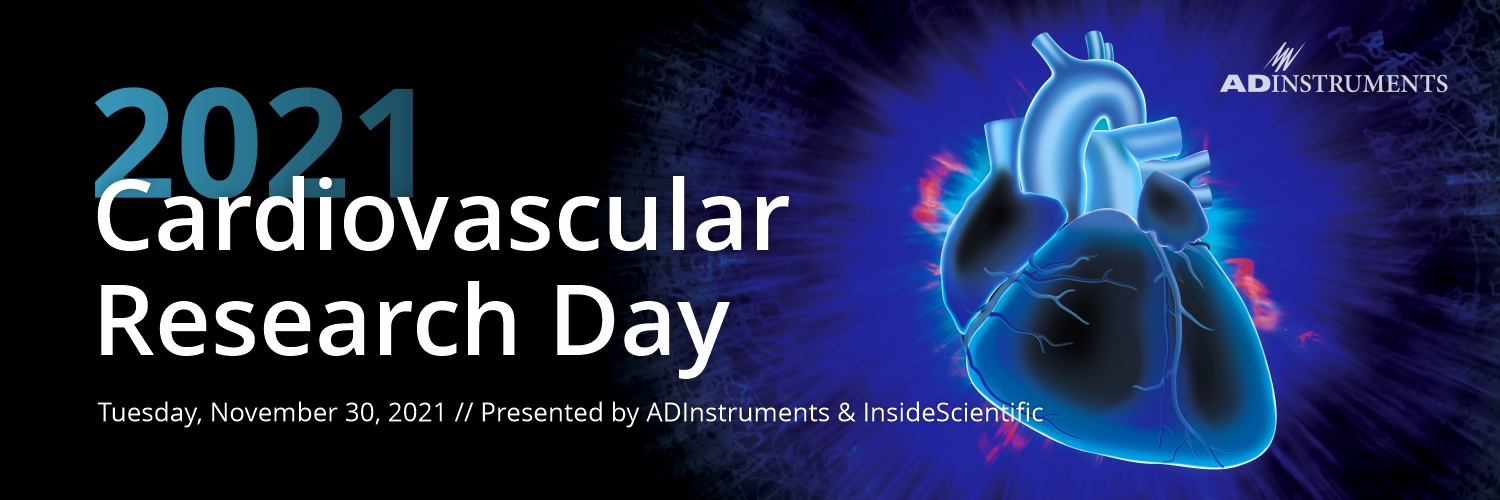
Cardiovascular Research Day 2021:
Latest Trends & Technology for Preclinical Cardiovascular Research
NOVEMBER 30, 2021
This 1-day, Virtual Summit presented by ADInstruments and InsideScientific addressed the latest trends and technology for preclinical cardiovascular research, research case studies from leading academic and industry scientists, and best practice tips & tricks to help advance your methodology and workflows.
To meet the diverse and multidisciplinary needs of preclinical cardiovascular researchers, scientific technology must be both powerful and adaptable. In this on-demand summit, hear from a variety of leading experts from academic and industry fields, on how the latest integrated technologies help them advance their preclinical cardiovascular research.
Key Topics
- Renal based cardiovascular disease and disorders
- Pulmonary hypertension
- Hemodynamic assessment and cardiac function
- ECG and Pressure for cardiac procedures
- Cardiovascular pharmacology
Technologies
- Invasive Blood Pressure and Flow
- Pressure-Volume Loop Systems
- Isolated Heart Systems (Langendorff)
- Electrocardiography
Part 1
Invasive blood pressure measurements in rodents for nephrology-related research
Merle Maas-Krebber
Merle will finish her PhD on regenerative medicine approaches for reno-cardiovascular disease (reno-CVD) in early 2022. Her research specifically focuses on overlaps and differences in inflammatory, fibrotic and regenerative processes of these reno-CVDs. Through her research, she has built up experience in rodent (micro-)surgery and invasive blood pressure and flow measurements.
Merle has extensive experience with in vitro and in vivo models of kidney-based cardiovascular disease.

Merle Maas-Krebber,
UMC Utrecht (UMCU), The Netherlands
In vivo cardiovascular pressure recordings – Exploring the physiology and pharmacology of monogenic syndromes of hypertension and hypotension
Dr. Keith Siew
Keith is a renal-cardiovascular physiologist and microscopist. He is a Sir Henry Wellcome Postdoctoral Fellow at University College London undertaking collaborations with Université de Paris and Harvard University during his fellowship. His work focuses on elucidating the links between dietary salt intake, renal electrolyte homeostasis and blood pressure control.
Keith’s research combines advanced 3D imaging of post-mortem and biopsied samples, with in vivo physiological and pharmacological assessments of both rare disease patients and genetically engineered animal models of renal electrolyte and blood pressure disorders.

Dr. Keith Siew,
University College London, UK
Pressure-volume recordings in small & large animals
Dr. Pedro Mendes-Ferreira
Pedro Ferreira is a Biologist from Portugal, who obtained his PhD in Cardiovascular Sciences in 2017 at the Faculty of Medicine of the University of Porto.
Most of his research work has been focused on the evaluation of cardiovascular function in animal models of cardiovascular disease, using both in vivo and in vitro methodologies. Pedro has more than 10 years of experience in performing bi-ventricular pressure-volume analysis in rodent models of pulmonary hypertension, and has recently (mid 2019) started a new role as the manager of the large animal facility at UnIC, where he performs pressure-volume analysis in pigs.

Dr. Pedro Mendes-Ferreira
University of Porto, Portugal
In vivo pressure measurements with fluid-filled and Millar catheters
Rajkumar Rajanathan
Rajkumar is currently undertaking a Ph.D. in Cardiovascular Physiology in Familial Migraine. He is also a Medical Doctor, qualified earlier this year.
Rajkumar routinely conducts open thorax surgery in mice to study cardiac function and blood pressure and has extensive experience using both types of catheters.

Rajkumar Rajanathan
Institute for Biomedicine, Aarhus University
Part 2
Use of hemodynamic tools in a large animal preclinical facility
Dr. Nicolas Borenstein
Nicolas Borenstein has pioneered surgical and transcatheter preclinical science, is a widely published author of research articles and textbook chapters and has served as a reviewer for multiple peer-reviewed journals.
IMMR is a differentiated, veterinarian-led Preclinical Science organization based in Paris, France. Our services include early stage through GLP interventional and surgical large animal studies to support worldwide regulatory approvals, pathology evaluation performed in-house and clinical/investigator training. IMMR has just joined a comprehensive, global, end-to-end service provider dedicated to the medical technology industry, Veranex.

Dr. Nicolas Borenstein, DVM, PhD
Scientific Director and Co-founder
IMMR, France
ECG and Pressure Monitoring Using ADInstruments’ Systems
Corey Leet
Corey Leet has a B.S. degree in Animal Science and a M.A. degree in Organizational Management. He has over 16 years of experience in pre-clinical research in various roles including working as a study director, operational manager and technical director at Medtronic, PRL and American Preclinical Services. Most of his work has been in large animal species (porcine, ovine, canine) with a wide range of medical devices such as cardiac pacemakers, cardiac valves, neuromodulation devices, drug coated balloons and vessel sealing devices. He currently leads a team of study directors that work on a wide variety of projects from clients around the world. Additionally, he helps to ensure GLP study protocols and reports meet regulatory requirements and client needs. Corey is passionate about helping advance medical research to find novel and effective therapies to help treat a wide range of clinical needs.

Corey Leet, MA
Scientific Technical Director
NAMSA/APS
The Use of ADInstruments at AstraZeneca
Patrícia Rodrigues
Patrícia is a senior scientist in Bioscience Cardiovascular, Research and Early Development, Cardiovascular, Renal and Metabolism (CVRM), Biopharmaceuticals R&D, AstraZeneca. She has a Masters in Cardiovascular Pathophysiology from the Medicine Faculty of Porto University, Portugal. At AstraZeneca, she is responsible for in vivo rodent pre-clinical studies for different AstraZeneca pipeline projects. When in the laboratory she does surgery, echocardiography and hemodynamic evaluation in rodents and isolation of adult cardiac cells from rodents hearts.

Patrícia Rodrigues, MS
Senior Scientist
AstraZeneca